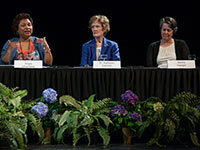At “Vision and Action: Pioneering Women Faculty at Notre Dame,” a panel of six notable University of Notre Dame women — all with successful careers in higher education and beyond — reflected on past and present experiences and also paid tribute to the earliest Notre Dame women faculty, several of whom were in attendance.
The latter were women who, in the opening words of Charles and Jill Fischer Provost Thomas G. Burish, were ambitious for the future and “helped Notre Dame transform from a college for men to a university for all.”
Moderated by Mary Celeste Kearney — director of the Notre Dame Gender Studies Program and associate professor of film, television and theater — Vision and Action included a diversity of disciplinary perspectives and offered words of wisdom for fostering an inclusive climate for all faculty at Notre Dame.

Nancy Haegel, class of ’81, a Notre Dame Trustee and director of the Materials Science Center in the Materials and Chemical Sciences Directorate at the National Renewable Energy Laboratory (NREL), was a member of one of the early classes of women students at Notre Dame. During that time there were very few women on the faculty and Haegel pointed to this formative experience, as well as 30 years of experience in higher education, as a prompt to consider the significance of institutional symbols. To demonstrate, she proposed an experiment of probability. Referring to the number of female United States presidents, she said, “Let’s assume talent is universal; what are the chances of picking 45 men in a row at random? 1 in 100 trillion. As a scientist receiving that result, I think I would need to stop and consider my assumptions.”
Sister Kathleen Cannon, O.P., associate dean of the College of Science, has been a faculty member and administrator at Notre Dame for nearly three decades. She described how essential a willingness to consider opposing viewpoints was in her work to effect positive change for women. She shared several examples of collaboration, including work she did to institute the first gender-inclusive language policy at the University level and an intense, interdisciplinary effort to develop a model for the Early Childhood Development Center based on a survey of campus child care needs.
Retired senior associate dean of First Year of Studies Angie Chamblee emphasized the need to be present in each moment — and said diversity comes in many shapes and sizes. Chamblee reflected on the challenges of not feeling fully accepted during her time as a Notre Dame student as a minority and first-generation college student. She emphasized from her years of experience that students, especially first-generation college kids, need mentors and models in college, and most of them do not know what they want to do with their lives. In approaching this priority, she added, “We have to be patient, we have to be aware of our biases, and we really have to be as open and inclusive as possible with these students.”

Asked how her time at Notre Dame has influenced her research and creative work, Valerie Sayers, professor of English and creative writing, responded, “How has it not?” Sayers added that she finds a constant source of replenishment in her departmental colleagues and believes mentors often come in the form of younger faculty members — and also students. Throughout her roles as department chair, on a tenure appeal committee and as an instructor and adviser, Sayers noted that sometimes the support people need to move forward through a challenge is to deliver their narrative and truly be heard.
Ann Tenbrunsel, David E. Gallo Professor of Business Ethics, described her research on how and why people and organizations move from ethical to unethical behavior (known as “ethical fading”) and begin to make choices that deviate from their core values. These factors can include illusions about one’s ethics as well as language that enables hiding from and growing comfortable with unethical behavior. Tenbrunsel said organization-level factors can also influence ethics outcomes, including what behavior gets rewarded (even unintentionally), informal norms, application of sanctions, motivated blindness and how one’s social context can lead to bias that favors an in-group. In closing, she added, “Progress involves identifying points of vulnerability and working to address them.”
Pamela Nolan Young, director for academic diversity and inclusion, closed the panel and thanked each of the panelists for their contributions.
Originally published by at news.nd.edu on April 04, 2017.